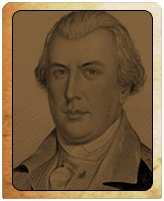
Nathanael Greene (August 7, 1742 - June 19, 1786) was a major general of the Continental Army in the American Revolutionary War. When the war began, Greene was a militia private, the lowest rank possible; he emerged from the war with a reputation as George Washington's most gifted and dependable officer. Many places in the United States are named for him.
On May 8, 1775, he was promoted from private to Brigadier General of the Rhode Island Army of Observation formed in response to the siege of Boston. He was appointed a brigadier of the Continental Army by the Continental Congress on June 22, 1775. Washington assigned Greene the command of the city of Boston after it was evacuated by Howe in March 1776.
Letters of October 1775 and January 1776 to Samuel Ward, then a delegate from Rhode Island to the Continental Congress, favored a declaration of independence. On August 9, 1776, he was promoted to be one of the four new major generals and was put in command of the Continental Army troops on Long Island; he chose the place for fortifications, and built the redoubts and entrenchments of Fort Putnam (the site of current day Fort Greene) east of Brooklyn Heights. Severe illness prevented him from taking part in the Battle of Long Island. Greene was also a Rhode Island Freemason and bore a masonic jewel, the gift of his comrade Marquis de Lafayette, on his person throughout the whole of the revolution.
Greene was prominent among those who advised a retreat from New York City and the burning of the city so that the British might not use it. He was placed in command of Fort Lee on the New Jersey side of the Hudson River. On October 25, 1776, he succeeded General Israel Putnam in command of Fort Washington, across the river from Fort Lee. He received orders from Washington to defend Fort Washington to the last extremity, and on October 11, 1776, the Congress passed a resolution to the same effect; but later Washington wrote to him to use his own discretion. Greene ordered Colonel Magaw, who was in immediate command, to defend the place until he should hear from him again, and reinforced it to meet General Howe's attack. Nevertheless, the blame for the losses of Forts Washington and Lee was put upon Greene, but apparently without him losing the confidence of Washington, who himself assumed the responsibility.
At the Battle of Trenton, Greene commanded one of the two American columns. After the victory there, he urged Washington to push on immediately to Princeton, but was overruled by a council of war. At the Battle of Brandywine, Greene commanded the reserve. At Germantown, Greene's command, having a greater distance to march than the right wing under Sullivan, failed to arrive in good time: a failure which Greene himself thought would cost him Washington's trust. But when they arrived at length, Greene and his troops distinguished themselves.
At the urgent request of Washington on March 2, 1778, at Valley Forge, he accepted the office of Quartermaster General. His conduct in this difficult office, of which Washington heartily approved, has been characterized as "as good as was possible under the circumstances of that fluctuating uncertain force." However, he had become Quartermaster General on the understanding that he should retain the right to command troops in the field. Thus we find him at the head of the right wing at Monmouth on June 28, 1778. In August, Greene and Lafayette commanded the land forces sent to Rhode Island to co-operate with the French admiral d'Estaing, in an expedition (the Battle of Rhode Island) which proved unsuccessful. In June 1780, Greene was in command at the Battle of Springfield. In August, he resigned the office of Quartermaster General after a long and bitter struggle with Congress over the interference in army administration by the Treasury Board and by commissions appointed by Congress. Greene had vehemently argued with Congress over how to supply the Continental Army. Congress was in favor of having the individual states provide equipment, which had already proven to be ineffective since the federal government held little to no power over the states. A month before Washington appointed him commander of West Point, it fell to Greene to preside over the court which, on September 29, 1780, condemned Major John André to death.
PREVIOUS: George Washington | Nathanael Greene | NEXT: John Sullivan
